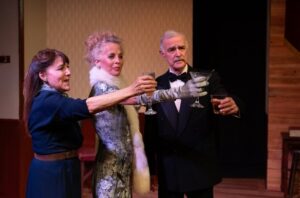If you’re reading this now, you’ve missed the run of this ground-breaking play at the Skylight Theatre. I, too, almost missed it: only through a stroke of luck did I catch it on the penultimate weekend. No Place Like Gandersheim, written by Elizabeth Dement, takes the real-life work of Hrotsvitha, a nun in the 10th Century, the first female playwright in Europe, and spins it into an examination of feminism in the 20th and 21st centuries.
Hrosvitha of Gandersheim was a well-born German nun whose education included reading the works of Terence in Latin and adapting them to suit her own day. She adapted Terence’s stories, concentrating mostly on the reasons for living a chaste life,. Her best-known play, Dulcitius, concerns a Roman general who has sequestered a number of virgins in order to ravish them. But the women turn the tables on him. Bewitched, he tries to ravish the pots and pans instead.
In the opening moments of her play, playwright Dement brings Hrosvitha’s story to life as the women in the nunnery await the arrival of Emperor Otto I. Hrosvitha’s play is meant to be the featured entertainment, but it is rather risqué, even for the 10th Century. Hrosvitha (also Roz, played by Jamie Hood), has to negotiate with Berga, the Mother Superior (Shannon Holt), in order to have her voice heard.
Dement segs another 1,000 years into the future to find Roz, now a television writer and single mother, who must negotiate much the same terrain in order to get her Sit-Com (based on the nunnery at Gendersheim) green-lighted by a similar male gate keeper. While Roz is still befuddled by the opposition she faces, now her nemesis in none other than a reincarnated Shannon Holt as Mallory (an hilarious depiction of post-feminist assertiveness). In this, the body of the play, Roz must fight to preserve her voice in the face of daunting network and studio opposition.
The last segment of the play brings us to a last, bewildering moment, where the goal seems to be “happiness” at any cost. This can only be achieved by “uploading” oneself in order to attain that eternal state.
Director Randee Trabitz has shrewdly kept production elements to a minimum in order to focus on the central themes. DeAnne Millais’ simple arches works equally well over the “centuries,” while Mylette Nora’s costumes transform from nun’s habit to pedal-pushers in a trice. Special mention should be made of the time-traveling transitions achieved through Shannon Barondeau’s psychodelic video design. And are you noticing that the entire team is made up entirely by women? This is unusual, even today.
This play does a great service in bringing feminist issues, especially social goals vs. personal happiness, into focus. Yet, despite our best efforts, the battle for equality has not yet been won. Stay tuned. There’s one more play in Skylight’s special series to go.
No Place Like Ganderhsheim completed its run this Sunday, June 25th. But for more on Skylight’s upcoming Hungry Ghost (late August -September), go to https://skylighttheatre.org.









